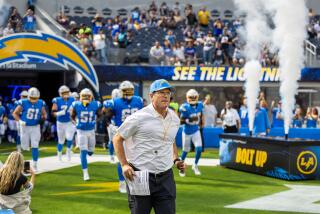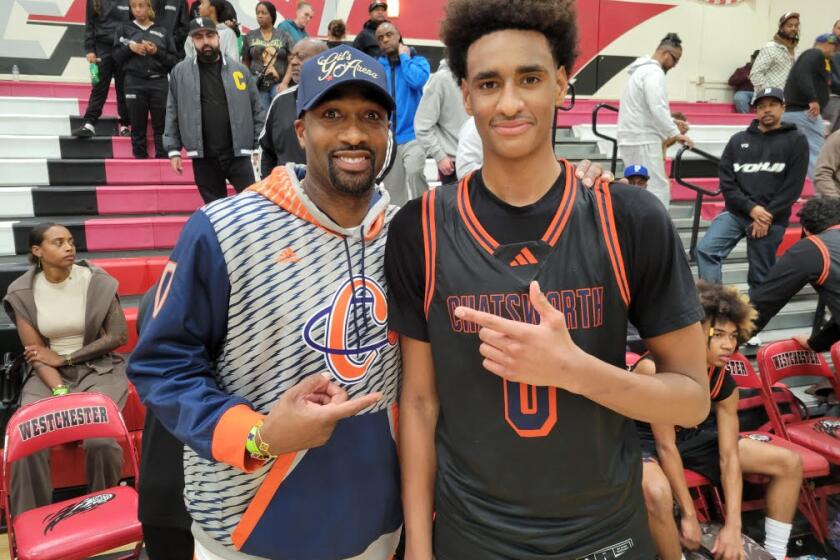Granada Hills Loses More Than a Coach
It only figured that Darryl Stroh would use a toilet next to the team’s dressing room as a prop to motivate his players at Granada Hills High.
“We just happened to have a bathroom where we dressed,” Stroh said. “I flushed the toilet and told them, ‘That’s how we played.’ ”
Stroh, the master motivator, is at the end of a nearly 40-year teaching and coaching career. As soon as Granada Hills’ football season has concluded, he’ll put away his whistle, lower his voice and start packing for a June departure into retirement in Arizona.
Granada Hills will never be the same. Forget that he guided five teams to City Section baseball championships. Forget that his 1987 football team pulled off one of the biggest upsets in City history by beating nationally ranked Carson. Forget that he coached John Elway.
The real legacy of Stroh will come from the hundreds of teenagers who were given a crash course in discipline and life skills by playing on one of his teams.
No one ever said it would be easy playing for Stroh. Many swore behind his back. Some were stupid enough to swear at him.
“He had the ability to really get under your skin,” said Elway, expected to be voted into football’s Hall of Fame next year.
Stroh arrived at Granada Hills in 1964, looking and sounding like a Marine drill sergeant.
“He was one of those crew-cut, hard-nosed coaches,” said Tom Harp, Stroh’s co-coach in football for 16 years. “He has real high standards and is willing to hold the players to those standards.”
As a baseball coach from 1970 through 1996, he required Highlander players to cut their hair to a certain length, and Stroh decided how short.
“I used to tell them it’s not that short hair makes you a better player,” he said. “It’s the willingness to do something as a group that you wouldn’t do as an individual for the good of the group.”
He was an assistant football coach for Jack Neumeier through the 1960s and ‘70s. He and Harp took over the varsity program in 1985, left after the 1993 season, then returned in 1998.
Stroh, 64, has mellowed, not yelling as often and even admiring his players’ haircuts.
“It’s kind of neat that their hair styles are such that they don’t bother me,” he said.
Physically, he feels better than ever, having undergone double hip replacement surgery in 2002. He has changed, just like his players.
“Society changes and kids react different to things,” he said. “The secret to coaching is the ability to adapt to what you’re handed. You have to find ways to sell them on things you believe in and motivate them. It’s so much harder today than it used to be. We’re a society of individualism and it makes it difficult in a team concept.”
Elway, who played baseball and football for Stroh from 1976-79, said Los Angeles will be losing a coaching legend.
“He was so important in my career, not only in football but in baseball,” Elway said. “He was a guy who was a disciplinarian. When you’re in high school and he has his rules and doesn’t budge, it lays a great foundation for young athletes, such as work ethic, how to practice and how to make it a priority in your life.”
In 1998, Stroh and Harp took over a football team that had gone 1-9 the previous season. The Highlanders won their first 11 games, picked up a forfeit win in game 12 before losing in the semifinals. That might have been Stroh’s most enjoyable year.
“It was absolutely one of the best times,” he said. “We won the first game and they started to believe everything we said. They trusted us and did anything we asked them to do. It was a tremendous, exciting experience.”
Stroh has his grouchy days. Just ask Harp.
“I think he gets up in the morning and tries to figure out what’s wrong and lets us all know about,” Harp said. “His most common line is, ‘This is the worst practice in 40 years, this is the worst team I’ve ever coached.’ We’ve heard that every year forever.”
The fact Harp and Stroh have coached together so long is a surprise. Stroh, who directs the defense, is conservative in politics and making decisions. Harp, who coaches offense, is liberal.
“Every time it’s fourth down, I want to go for it and he wants to punt without fail,” Harp said.
But Harp admires Stroh’s consistency in his beliefs.
“We have a lot of differences, but we have a strong will to win,” he said.
Stroh entered coaching four decades ago because he believed in the philosophy that sports is an effective way to pass along life lessons. He has been inspired by seeing countless former players come back to offer thanks or tell him they are succeeding as adults because of their sports experience.
One former player, in particular, visited Stroh and told him how his refusal to compromise his standards forced him to change. The player was experimenting with drugs.
“He said, ‘Whatever you do, don’t let the standards down because you make people make a decision,’ ” Stroh said. “He looked me in the eye [and said], ‘You saved my life.’ That’s an example I’ll never forget. That’s the real reward in doing what [coaches] have done for years.”
Stroh will be leaving with Judith, his wife of 43 years, on June 5 for Arizona, where he plans to learn about lawn bowling, golf and ping-pong.
Harp warns the golfers of Arizona: “I’ve played with him a couple of rounds and he got quite efficient at the club throw.”
As for the former players who experienced having a toilet flushed in their faces, Stroh said, “A bunch of them swore when I pass, they’re going to get my ashes and take them into that toilet and have a little ceremony and flush it.”
Gone but never forgotten. That will be the Stroh legacy.
*
Eric Sondheimer can be reached at eric.sondheimer@latimes.com
More to Read
Get our high school sports newsletter
Prep Rally is devoted to the SoCal high school sports experience, bringing you scores, stories and a behind-the-scenes look at what makes prep sports so popular.
You may occasionally receive promotional content from the Los Angeles Times.







